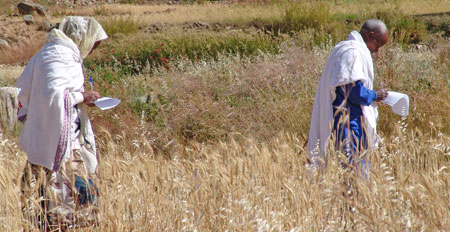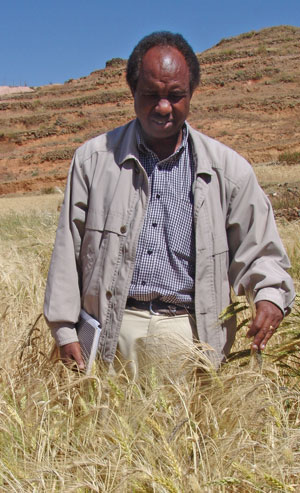Vandana Shiva has a long post at countercurrents.org outlining some of the ways in which small but biodiverse farms could make a greater contribution to food security in India. She lambasts the government for its policies and quotes some very favourable figures for harvests and incomes, alas without supporting references.
Eritrean farmers use agricultural biodiversity to improve agricultural production
Salavatore Ceccarelli is a researcher at ICARDA, the International Centre for Agricultural Research in the Dry Areas. In response to our post about barley diversity he sent this article, about how farmers and researchers are working together to use biodiversity to improve production and stability. As he concludes: Farmers are being progressively empowered, as indicated by one of the participating farmers who said, “we feel we have taken back science into our own hands.”
Eritrea is among the 10 poorest countries in the world, with GDP per capita of US$160. The economy is largely based on subsistence agriculture, with more than 80% of the population (~3.7 million in 2000 and growing at 3.8% per annum) living in rural areas and depending on farming and livestock production. The staple crops are barley (16% of total food production) and wheat, mostly produced in the highlands, together with cool season food legumes (lentil, chickpea and faba bean), which provide most of the daily protein requirement.
In 1997 it was estimated that two thirds of Eritreans were undernourished, and 40% of children under the age of five were malnourished. Approximately 30% of food consumption comes from food aid. Land degradation is extreme as a result of deforestation (from 30-40% to less than 0.1% now) and over-grazing over hundreds of years.

Eritrean farmers assess the crops in their fields
The prolonged and very dry season, roughly from November to April, means that the fields lie as bare cultivated fallow for many months, ready for planting as soon as the rainy season starts. Rainfall (500-700 mm per annum) is highly erratic and variable, and most falls during a short period between June and August. The start of the rainy season is also highly erratic in terms of time and amount. There are small pockets of irrigation in the river valleys of the Atbara basin, mostly for vegetable production, through small dams and groundwater pumping.
The country, like its neighbour Ethiopia, is rich in diversity for all the most important crops. Diversity is also part of the culture of the farmers who cultivate diversity in several ways. They grow different crops and different cultivars of a given crop and also grow landraces that are a mixture of different genotypes. They also cultivate two different species, usually barley and wheat, in a system known as hanfets or hanfetz (a Tigrigna word which means mixture of different things).
 Hanfets, which is also common also in Tigray, the most northern region of Ethiopia, is a highly sophisticated way to cope with the very unpredictable nature of dry lands that will become increasingly more unpredictable with climate change: wet years favour the higher yield potential of wheat, dry years favour the better drought tolerance of barley, the incidence of diseases (particularly rusts in wheat) is reduced, and, as farmers claim, the bread (Kitcha) made out of the mixture tastes much better (and is more digestible) than wheat or barley bread. Pictured left, Professor Woldeamlak Araia 1 of the Hamelmalo College of Agriculture is a pioneer in working with hanfets.
Hanfets, which is also common also in Tigray, the most northern region of Ethiopia, is a highly sophisticated way to cope with the very unpredictable nature of dry lands that will become increasingly more unpredictable with climate change: wet years favour the higher yield potential of wheat, dry years favour the better drought tolerance of barley, the incidence of diseases (particularly rusts in wheat) is reduced, and, as farmers claim, the bread (Kitcha) made out of the mixture tastes much better (and is more digestible) than wheat or barley bread. Pictured left, Professor Woldeamlak Araia 1 of the Hamelmalo College of Agriculture is a pioneer in working with hanfets.
The Challenge Program on Water and Food of the Consultative Group for International Agricultural Research (CGIAR) is funding a project 2 to enhance food security and alleviate poverty in the Atbara river basin (which drains into the Nile). The project’s activities include selection, development and adoption of improved varieties of barley, wheat, and legumes, establishment of systems for rapidly providing locally adapted improved varieties, and strengthening the capacity of the national researchers to undertake participatory research. The project has four major features:
- the use of participatory research approaches, centered on participatory varietal selection and plant breeding;
- the use of the local germplasm available in the National gene bank;
- all the trials are conducted in farmers’ fields in 12 villages and all the key decisions are taken by the farmers (both men and women);
- all the work is implemented by Eritrean scientists, and therefore it has an important training component.
Among the major achievements, farmers have increased yields by up to 20% in barley, 31% in wheat, almost double in lentil, and 6% in faba bean. They have done so by selecting within their local landraces, under their usual system of management. As the genetic resources available in the National Gene Bank are being evaluated, new collections as well as crosses between the superior landraces are planned to generate a continuous flow of germplasm into the participatory breeding programs.
The introduction of additional genetic diversity into farmers’ fields, from which farmers will select the best locally adapted material, corresponds to the habit of Eritrean farmers of going out of the village to seek novel cultivars of the various crops, bringing few seeds back to the village, and starting to experiment with them: a number of cultivars were produced in the past in this way.
Farmers are being progressively empowered, as indicated by one of the participating farmers who said, “we feel we have taken back science into our own hands.”
For more information, contact Stefania Grando: s dot grando at cgiar dot org
Public awareness of global environmental change
Swedish TV has recently shown a series of four programmes on global environmental change called “The Planet.” There’s an accompanying website, and from the blog Resilience Science now comes news of an English-language version. The aim of the website is to “enhance public awareness and knowledge about the Planet and our future, to show the limits, threats and possibilities we are facing today.” So what? Well, unusually for this kind of thing, there’s actually (some) material on agriculture! The website is in Flash, so I can’t link to the actual bit, but just click on the circle labelled “Earth” and you’ll get there. There’s other interesting stuff too.
Tiger wine
Here’s an interesting way of adding value to an agricultural product: take rice, make rice wine, then soak tiger carcasses in it. Not everyone approves.
Growing entrepreneurs in Africa and India
Three fine recent articles all point to ways in which farmers are diversifying their approaches and improving their lives. From East Africa, Catherine Mgendi reports on five years of a project called Enabling Rural Innovation.
“We want to have a developed village with at least one car,†beamed a middle-aged man, drawing cheers from fellow men gathered in the village social hall-cum-church. The women differed, chiding the men for not setting their eyes on more realistic goals such as bicycles.
It’s a long article, full of interesting insights and experience, and well worth reading in its entirety. I managed to fillet this as a kind of summary.
By equipping farmers with essential skills such as organisation and leadership, record keeping, market research and analysis, decision-making, planning and prioritisation, the Eri model empowers subsistence farmers to set their own priorities. These could be new market opportunities for their produce, better prices or the need to develop strategies for mitigating drought/flood-induced famines through diversification, for example. It also opens their eyes to ways of exploiting research and extension support.
From India, news that farmer field schools conducted by the centre for Environment Education have helped farmers in an area of Gujerat move from their traditional crops to more lucrative options that make use of increasing irrigation.
“The cropping pattern has changed with increase in irrigation and wider crop options. Halvad has traditionally been a cotton-growing area. However, with the increase in irrigated area, hybrid cotton has begun to replace older indigenous crops like jowar, bajra and groundnuts. … While the deteriorating water quality has forced farmers to shift to crops that can withstand hard water crop, the raids by wild asses and feral pigs has forced farmers in the vicinity of Little Rann of Kutch to grow crops unpalatable to wild animals.â€
If they have water problems now, how long before they cannot grow the new crops and are clamouring for their lost heritage?
And in Ghana, The Economist reports that a new, UK-based chocolate company called Divine Chocolate has cocoa farmers as its largest shareholders. The Economist’s article is behind a paywall, which is why I am linking to Divine’s site and a TV report from Reuters. This one was a real eye-opener to me. As The Economist points out, cocoa farmers worldwide earn about US$4 billion — big bucks except when you consider that global chocolate sales are worth about US$ 75 billion.
The money, in short, is in chocolate–and African farmers are not really in a position to expand into chocolate-making.
Except that they are.
Kuapa Kokoo, Ghana’s largest co-operative, with a membership of 45,000 cocoa growers, owns 45% of Divine and has two seats on its board.
Another astounding fact, from the Reuters report: In Ghana, the average cocoa farmer earns about US$300 a year. US$ 300 is also what the average British family spends on chocolate every year.
The Economist suggests that farmers are increasingly moving upstream to capture value from their efforts.
Other companies are pursuing similar strategies. Agrofair, a tropical-fruit distributor based in the Netherlands, is half-owned by producers. It in turn owns a part of Oké USA, which markets Fairtrade bananas in America. Pachamama, a federated co-operative of Latin American coffee growers, has just completed its first year roasting coffee in America. With the help of in-kind loans of green coffee from its members, the firm has not had to solicit outside investors at all. And Coffee Pacifica, a coffee importer that is publicly traded in America, is one-third owned by the Papua New Guinea Coffee Growers Federation, which represents 120,000 farmers. In 2006 the firm’s sales doubled to almost $3m in America and Europe.
All this, I would venture, should also have a beneficial effect on agricultural biodiversity, but I have no idea whether one could ever demonstrate that impact.